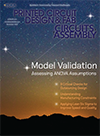HDPUG Releases Revised Pb-Free Guidelines
SCOTTSDALE, AZ -- The High Density Packaging User Group has updated its landmark 2004 Pb-free guideline on issues faced by manufacturers of high-reliability electronics.
The revised document has been supported by senior technical representatives from several of the industry's leading system integrators, all of which are at the forefront of their companies' Pb-free product development programs. They were joined by technologists from major players in the component/materials supply and printed circuit board fabrication and assembly fields. The guideline provides a valuable status report on the progress that has been made in Pb-free technology since mainstream adoption in 2006 and the issues that remain for producers of currently RoHS exempt products. It is structured into chapters focusing on current legislation across the globe, market drivers, materials and component considerations, manufacturing issues/solutions and transition/ongoing cost impacts.
While there are still a number of outstanding concerns about the performance of Pb-Free solder alloys over an extended period of time, much of the data produced by the industry to date indicates that SnAgCu (SAC) solders are an acceptable substitute for SnPb eutectic solders in a wide range of (but not necessarily all) applications. However, there remain some questions to be answered. In response, HDPUG has embarked on a broad range of reliability related studies over the last five years to examine the performance of Pb free materials and the impact of adopting these materials into mainstream electronics. Many of the results and conclusions derived from these projects are incorporated in the guideline.
Project leader Thilo Sack of Celestica said, "The perception exists that since Pb-free has largely been implemented successfully in consumer applications that there should be no issues in transitioning those products still making use of the exemption. The aim of this revised Pb-Free guideline is to raise awareness and bring attention to the outstanding issues that still exist in the supply chain from the learning to date which will challenge the easy transition of currently exempt products to Pb-free."
HDPUG is a non-profit trade organization. The HDPUG Pb-Free guideline is available for download at www.hdpug.org.
Press Releases
- Altus Partners with Sellectronics to Enhance Manufacturing Capabilities with PVA Delta 8 System
- ITW EAE Celebrates Major Milestone in Domestic Manufacturing Expansion
- Micro Technology Services Selects PBT Works CompaCLEAN III for Advanced PCB Cleaning Performance
- Indium Corp. is Electrifying the Future with Advanced Materials Solutions at Productronica







